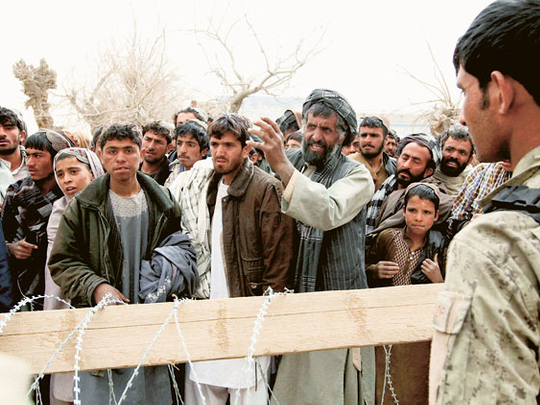
Peshawar The countrywide protests in Afghanistan over the burning of the Quran by Nato forces at the US airbase at Bagram on February 21 have more or less ended, but the anger caused by the incident will take time to subside.
Any fresh incident hurting the religious sentiments of the Afghan people or further civilian casualties in Nato military operations would likely cause stronger public reaction than the past. Such happenings could serve as a flashpoint and trigger more protests because the wounds resulting from the violence following the Quran burning incident have yet to heal.
There is no guarantee that such incidents won't happen again. The conflict in Afghanistan is becoming bloodier every year and casualties on all sides are rising. According to a UN report, 2011 was the fifth straight year that the death roll has risen as a total of 3,021 civilians were killed, mostly at the hands of the militants and up 8 per cent from 2,790 in 2010. Though the US and Nato military commander, General John R. Allen, gave orders soon after the Bagram incident that all US military personnel in Afghanistan undergo 10 days of sensitivity "training in the proper handling of religious materials", one doesn't know how something that couldn't be done in 10 years since the US invasion in October 2001 could happen in 10 days.
The national mood in Afghanistan following the Quran burning incident was one of shock and anger. From President Hamid Karzai to the Afghan Army chief General Sher Mohammad Karimi to the Taliban spokesman Zabihullah Mujahid, the reaction was quick and strong-worded.
Justifying the protests as the right of the Afghan people, Karzai termed the reaction "respectable" and said those involved in the Quran burning should be handed down stern punishment. At the same time, he called for calm and urged the protesters to avoid violence and refrain from endangering lives and properties.
Trigger-happy policemen
His appeal largely fell on deaf ears as the protests continued for a while and were often violent. The death toll of protesters fired at by inexperienced and trigger-happy Afghan policemen quickly rose to 30 and over 200 others were injured.
General Karimi described the Quran burning as a blunder and warned that any repeat of similar "negligence" by western forces would be disastrous and would allow the Taliban to further exploit the situation.
Indeed it was a godsend opportunity for the Taliban to use to their advantage. Terming the burning of the Quran as barbaric, unethical and unjustifiable, a statement issued by the Taliban's Islamic Emirate of Afghanistan called upon the Afghan soldiers, policemen and commoners to turn their guns on the infidels, a term they routinely use for the Nato troops.
Some Afghan cops and soldiers didn't need the Taliban exhortations to turn their guns on the Nato troops. Six foreign soldiers, all Americans including two officers working as advisers at the fortified interior ministry building in Kabul, were killed by rebellious policemen and soldiers. Many joined the protesters or sympathised with their cause. Some openly told reporters that they cared more for respect being shown to their religious beliefs than their jobs. Soldiers, policemen and protesters were quoted as saying by the media that a mere apology by US President Barack Obama and his military commanders wasn't enough. Instead, they demanded an open trial of those responsible for the Quran burning in Afghanistan. Some said they would take their own revenge if an opportunity arose.
Temporal withdrawal
This is something alarming. General Allen did the right thing to temporarily withdraw all Nato officers working at the Afghan government ministries and departments for their own protection after the murder of an American Colonel and a Major by an Afghan police intelligence officer at the interior ministry. However, the Nato and Afghan army and police officers have to work together for training Afghanistan's security forces to take charge by the 2014 deadline when the US-led forces would have completed the drawdown.
The distrust between the two sides is a matter of concern for all those involved in the faltering Afghanistan project, but there is no alternative to eventually handing over security to the Afghan forces. There have been 46 recorded incidents of "deliberate attacks" by rogue Afghan soldiers and police since May 2007 and 76 Nato soldiers have been killed and an undisclosed number wounded. Such attacks could increase in the aftermath of the burning of the Quran.
To make matters worse, the Afghan government and the US have been unable to resolve their differences over the issue of the night-time raids by Nato forces and the control of prisons in Afghanistan. This is holding up the signing of their strategic partnership agreement. The peace process is also stalled as the Taliban are unwilling to discuss any other issue with the US officials in Qatar except the exchange of prisoners and are becoming more belligerent in their stance following the widespread Afghan protests due to the Quran burning incident. As efforts to stabilise Afghanistan aren't working, perhaps it is time to lower the expectations and change the goalposts.











